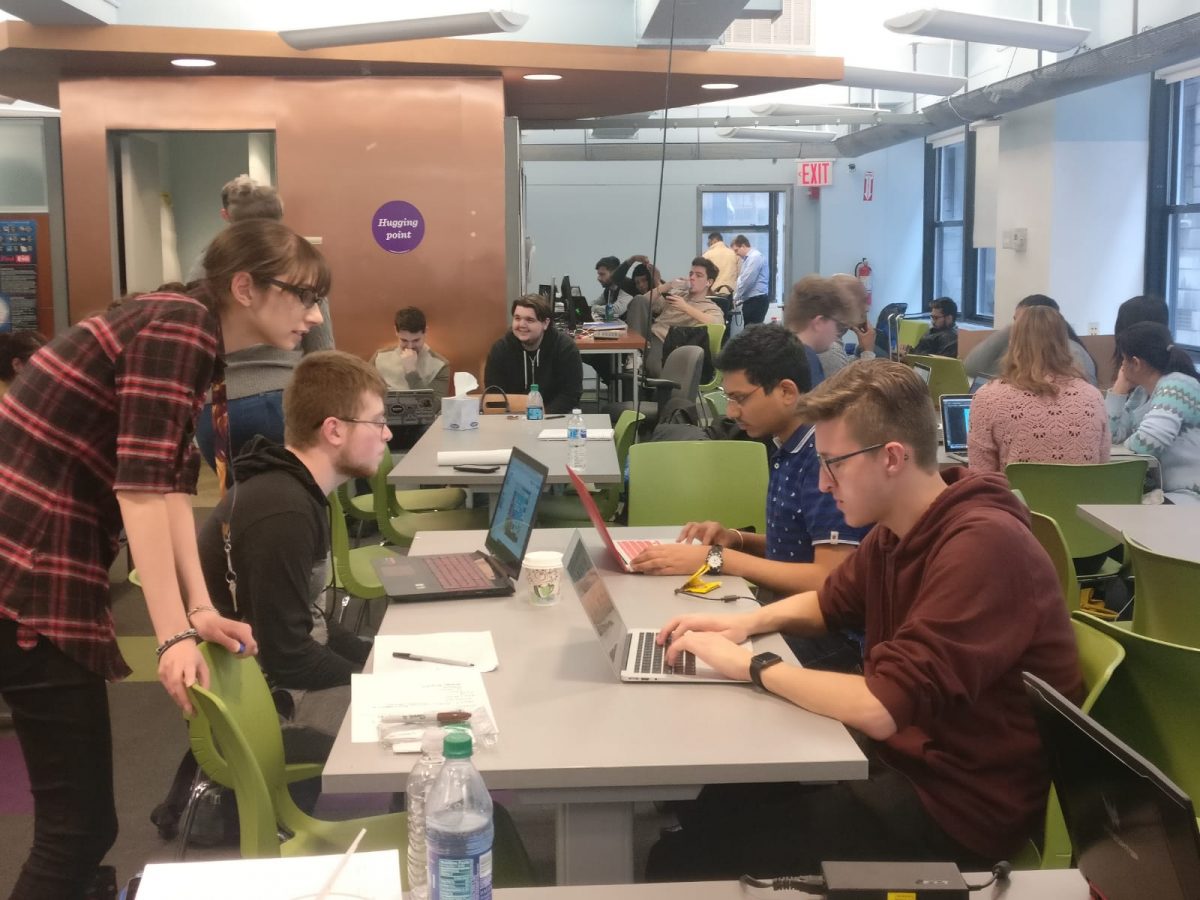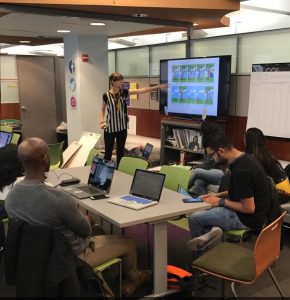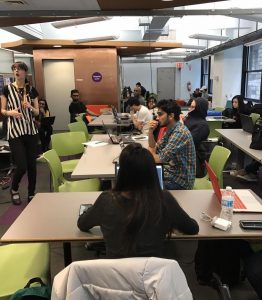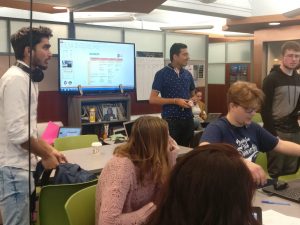Woohoo! This semester’s Rat Relay was an enormous success! Students from Pace and other universities around the world participated in this exciting hackathon from March 20-23 across four days of innovation and design.
Rat Relay is a four day global design hackathon that is run by the Design Factory Global Network, of which our very own NYC Design Factory (NYCDF) is part. During the event, students from different parts of the world worked on real problems for NGOs, non-profits, or businesses located just about anywhere around the world. Nine Design Factories participated in the challenge, which are: NYCDF, Frisian Design Factory, Melbourne Design Factory, Aalto Design Factory, Porto Design Factory, Cali Design Factory, Bogota Design Factory, Warsaw Design Factory and Ghent Design Factory. Students worked together to define the problem a business may have, and came up with solutions through ideation, prototyping, and testing, before finally presenting their materials.
Rat Relay was held in the Seidenberg Lounge at 163 William Street (with students from other universities around the world participating digitally over Skype!). It was a 36 hour event, which was divided into separate slots of 6 hours each. It worked just like a relay – just as one member passes the baton to the next, participants worked on one aspect of the innovation for 6 hours and when time was up for one slot they handed off their project to another team from another part of the world. The new team then picked up the project where the previous team left off.
Here’s what happened in each part:
Slot 1: Tuesday, March 20th, 3pm-9pm
It started with New York Design Factory. The innovation theme they worked on was EMPATHISE (Getting to know the user). The challenge: how to help students with autism learn how to self-advocate. The sponsors – Tech Kids Unlimited – had come and they spoke to the participants about autism in this slot.
Slot 2: Wednesday, March 21st, 8am-2pm
The project was handed off to Aalto Design Factory in slot 2. The aspect of innovation they worked on was REFRAME (Redefining the problem). The challenge they worked on: how to keep people involved in an environmental campaign.
Slot 3: Wednesday, March 21st, 3pm-9pm
Frisian Design Factory worked in slot 3. The theme was IDEATION (Coming up with possible solutions). The challenge they worked on: what to do with the waste from natural disasters.
Slot 4: Thursday, March 22nd, 8am-2pm
The project went to Melbourne Design Factory for slot 4. The aspect of innovation they worked on was PROTOTYPE (Making designs for solutions). The challenge they worked on: home use for graphene floors.
Slot 5: Thursday, March 22nd, 3pm-9pm
Cali Design Factory continued with project in slot 5. The aspect of innovation they worked on was TESTING (Testing the Prototype). The challenge – how to stop kids from joining guerrilla gangs.
Slot 6: Friday, March 23rd, 8am-2pm
New York Design Factory took the project in the last slot. The aspect of innovation they worked on was PITCHING (Presenting all the created stuff). They presented the challenge: how to help students with autism learn how to self-advocate
By the end of the, the distributed team had come up with a solution: a mobile application named “SPEAK UP STREET”. This app teaches the students with autism how to speak up for themselves in real world situations. The app is designed as a game where users choose between a selection of responses to different types of situations. The app challenges users to play in in-game locations such as at home, at a friend’s house, school, and many other social places. When travelling to these locations, users will encounter various situations where they have to respond to a stimulus. Choosing the right option will explain to them why it is right and it will move them forward in the game. If they choose the wrong answer it will explain why it is wrong and ask them to choose something else or come back to it.
It was wonderful to have such an energetic and enthusiastic event when students had just returned from their Spring Break! Hosted by Dr. Jaclyn Kopel, Director of the Pforzheimer Honors College and Interim Director of the NYCDF, each slot of this Rat Relay was packed with excitement. Participants really enjoyed working with people around the world, and there were 50 unique participants in total. From Pace, both undergraduate and graduate students came from the Seidenberg School of CSIS, the Lubin School of Business, Dyson College of Arts and Science, the School of Education, and the Honors College.
Getting real world experience working for international companies, working with innovation, improving one’s problem solving skills, and working in international, interdisciplinary teams is a hugely beneficial experience for students. Participants received a certificate saying they worked with 9 international companies and 8 countries. Freshmen and sophomores students had the advantage of getting on the NYCDF radar for the expanded versions that involved travel to other countries (Finland, Portugal, Poland, and Austria).
As always, the Rat Relay was an exceptional event and we can’t wait for the next one in the fall!





